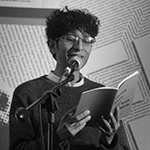Seeds from the New World I (English)

Semillas de “El Nuevo Mundo I”

Translator’s note
In 2007, as a 21-year-old industrial design student, Yaxkin Melchy Ramos began writing what would become his decade-in-the-making poetic project, EL NUEVO MUNDO (THE NEW WORLD). It is a thousand-page, kaleidoscopic work that he imagines as a “cell-book, constellation-book, or choreography-book” exploring “the contemporary world of mega-cities, science, the Internet, school, home, means of access to poetry, networks of friendship, etc.” The poems featured in this issue of ANMLY are taken from El Nuevo Mundo I (The New World I), the first of five full-length books that comprise THE NEW WORLD. Each of these poems showcase the range of Yaxkin’s poetics, incorporating visual poetry, typographical play, and sprawling lyric sequences. As I’ve worked with Yaxkin on the translation of these poems, he’s consistently referred to them as seeds. With that in mind, I’m grateful to ANMLY for providing fertile ground to “replant” them.
In 2015 I came across a downloadable pdf of The New World I, and was immediately struck by Yaxkin’s celebratory, collectivist approach to poetry. At the time, I was new to the world of poetry and even newer to the world of translation. Already, I was frustrated with the hyper-academic, prestige-driven current that I felt swirling through the stoic readings and prize tallying of many literary spaces. In Yaxkin’s work, I encountered an ethics of access and action that treated poetry as an embodied, community-rooted, community-producing art meant to live and breathe beyond the page or university walls. This was a poetry I could believe in.
Since first encountering The New World I, I’ve been itching to translate it. This year, I’ve been lucky enough to work with Yaxkin to make that dream come true. In the throes of 2020, it’s been restorative to spend time in a collection that is simultaneously playful, meditative, and unabashedly heartfelt, while also heavily critical of, in Yaxkin’s words, “the commercialization, violence, frivolity, and egocentrism that are values capitalist culture has tried to impose on daily life and literature.” Rather than wait for a better world to come—a world of ecological connection, queer love, and cybergalactic creativity—Yaxkin writes it into existence and invites us to join. It is poems like these that help me to know that a new world is not only possible, but ready to bloom.

Ryan Greene is a translator, poet, and book farmer from Phoenix, Arizona. He’s a co-conspirator at F*%K IF I KNOW//BOOKS, and he’s translated work by Elena Salamanca, Claudina Domingo, Ana Belén López, Giancarlo Huapaya, and Yaxkin Melchy, among others. Since 2018, he has facilitated the Cardboard House Press Cartonera Collective bookmaking workshops at Palabras Bilingual Bookstore. Like Collier, the ground he stands on is not his ground.

Yaxkin Melchy Ramos (Mexico City, 1985) is a Mexican and Peruvian-Quechua poet, translator, ecopoetics researcher, bookmaker, and artisan-activist-editor. He is the author of THE NEW WORLD, a five-part “cell-book, constellation-book, or choreography-book” which was written intermittently between 2007 and 2017. Currently he is a graduate student at Tsukuba University in Japan, where he is researching ecopoetic currents between Japan and Latin America. Since 2017, he has been translating contemporary Japanese poetry to Spanish, and currently he runs the artisanal press Cactus del viento, which focuses on ecological, spiritual, and transpacific poetics. He also publishes on his personal blog, Flor de Amaneceres.

 BACK TO ISSUE
BACK TO ISSUE